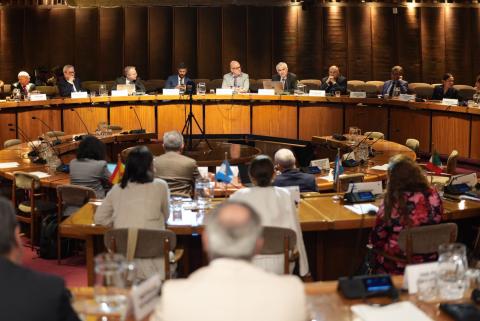Announcement
Monetary metrics are inadequate for reflecting dimensions of well-being that are not directly related to income because they overlook inequalities in the distribution of well-being among different social groups, they fail to capture governance difficulties that erode the quality of democracy and they do not take into account the impacts of environmentally unsustainable practices that endanger the life prospects of present and future generations, according to the authorities and specialists gathered at the Seminar on the Measurement of Development and its Relationship to International Cooperation, which is taking place through Tuesday, January 28 at the main headquarters of the Economic Commission for Latin America and the Caribbean (ECLAC) in Santiago, Chile.
They added that all these limitations show the need to provide ourselves with more comprehensive measurement tools for analyzing development and social progress, which would enable monitoring economic and social gaps and evaluating the sustainability of development.
The seminar – organized by ECLAC with the collaboration of the Government of Spain and the Ibero-American General Secretariat (SEGIB) – was inaugurated by José Manuel Salazar-Xirinachs, the United Nations regional commission’s Executive Secretary, who emphasized the urgency of moving towards new development metrics.
“In September 2024, global leaders approved the Pact for the Future, in which they called for transforming global governance and accelerating reform of the international financial architecture. The Pact recognizes that developing countries need more access to financing from all sources to achieve the Sustainable Development Goals (SDGs) and that numerous developing countries are receiving fewer capital flows and in many of them, more capital is leaving than entering,” ECLAC’s highest authority affirmed.
In his remarks, José Manuel Salazar-Xirinachs stressed that the discussion on development metrics is not of conceptual interest alone, but has clear practical implications for international development assistance and cooperation.
He added that the way in which development is measured has a direct influence on the type of cooperation that countries establish for promoting economic and social progress and on the eligibility criteria for receiving that cooperation.
“The habitual practice of multilateral financial institutions is to use per capita income as the indicator that synthesizes the level of a country’s economic and social progress and guides the allotment of resources that go to developing countries. This practice has been criticized since the strictly monetary criteria used to allocate development assistance are insufficient for capturing the problems that affect middle-income countries, which is particularly relevant in the regional context,” he stated.
The Executive Secretary of ECLAC recalled that in its current understanding of regional development challenges – contained in the document Development Traps in Latin America and the Caribbean: Vital Transformations and How to Manage Them, which was presented to countries during its fortieth session – the Commission affirms that the region is caught in three development traps: one involving low capacity for growth, another of high inequality, low social mobility and weak social cohesion, and a third trap of low institutional and ineffective governance capacities.
“ECLAC has defended the adoption of a broad and multidimensional approach to development that would not be limited to average income or per capita income but instead would incorporate sustainability, equity and the diversity of social and economic contexts,” he underscored.
The senior United Nations official announced that ECLAC will soon release a Multidimensional Poverty Index for Latin America, which provides a comparable measurement for 17 Latin American countries based on standards suited to middle-income countries, which is relevant for the allocation of international cooperation.
The Seminar on the Measurement of Development and its Relationship to International Cooperation is being attended by more than one hundred participants from ECLAC’s Member States and associate members, international, regional and United Nations system organizations, and academia.
The event consists of three panels. On the first one, participants will address the criteria for development banks to grant concessional loans and will examine their limitations in relation to countries with intermediate development levels.
The second panel will analyze the state of the art in development measurements beyond GDP, taking into account the path ahead following the Summit of the Future. In addition, participants will present the results of the Multidimensional Vulnerability Index, unveil statistics at the forefront of the financing-for-development agenda, and reflect on development measurement from a public policy perspective.
Finally, the third panel will explore options for a new development metric, using as a framework some of the dimensions identified by ECLAC as part of the 11 transformations that Latin America and the Caribbean must implement urgently in order to move towards more productive, inclusive and sustainable development.



